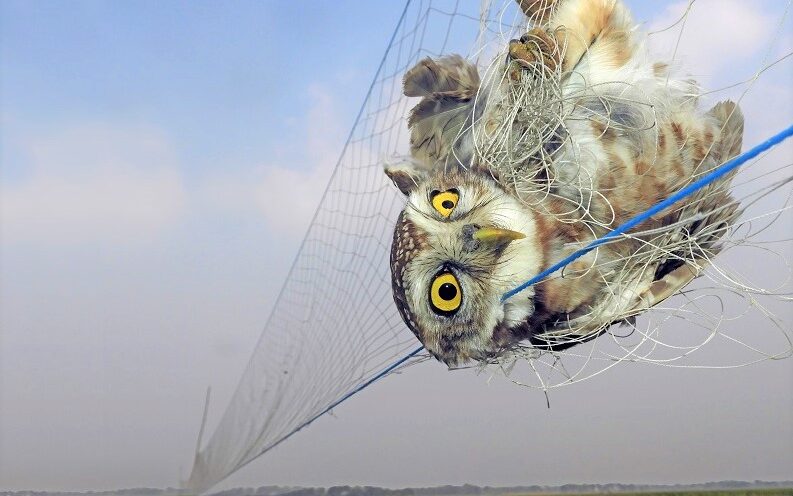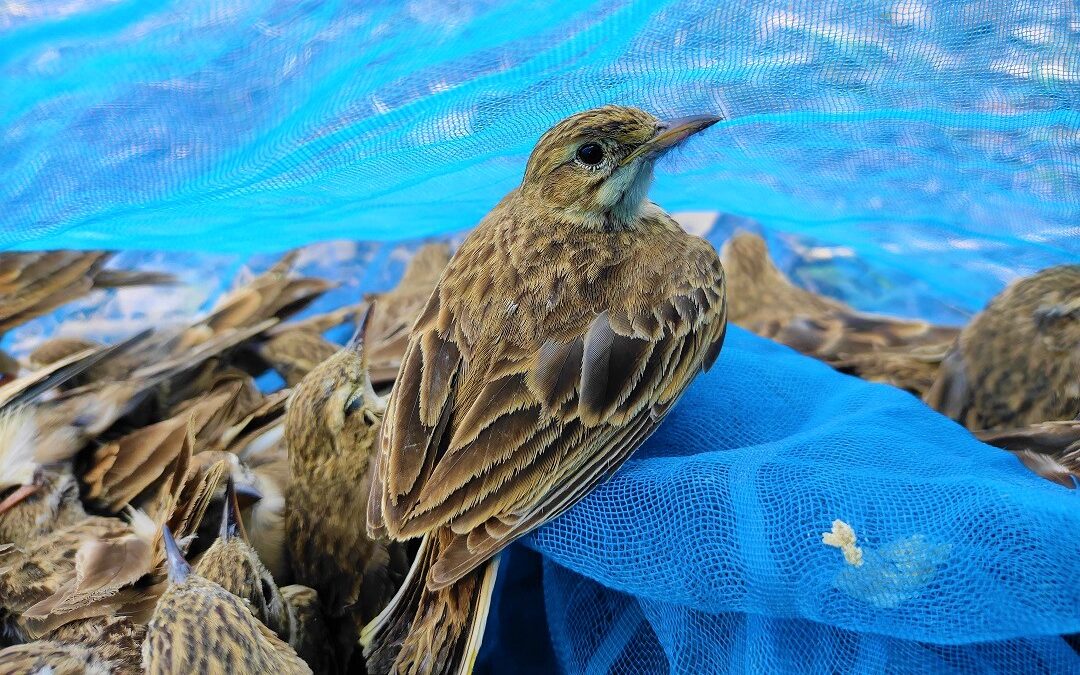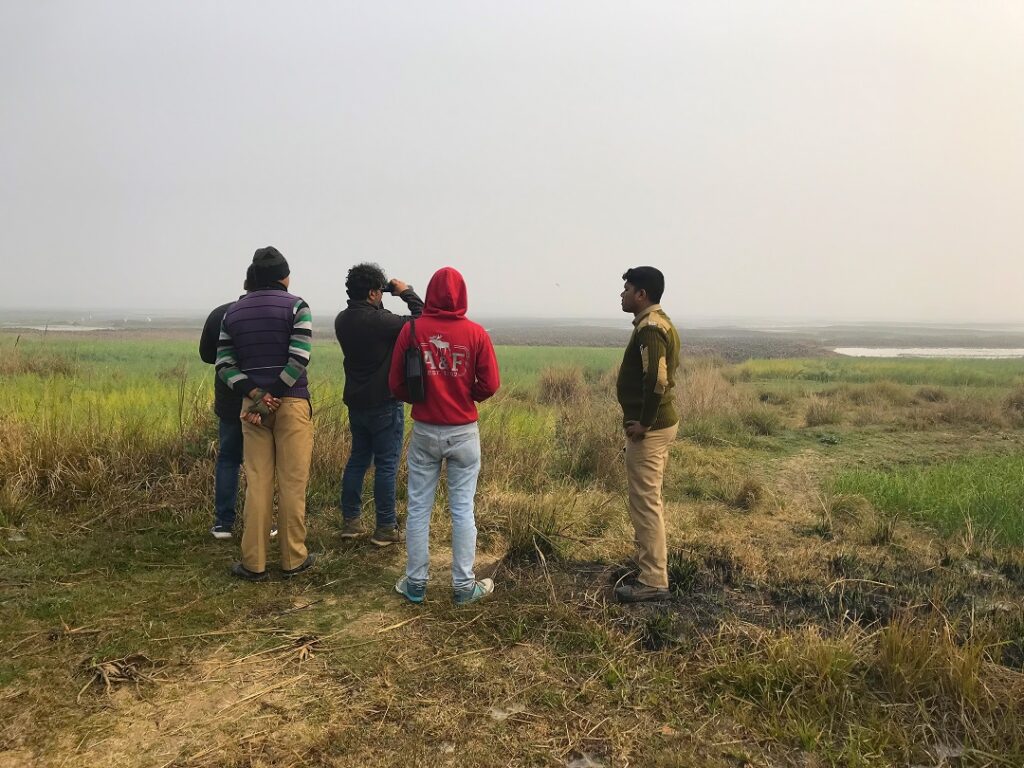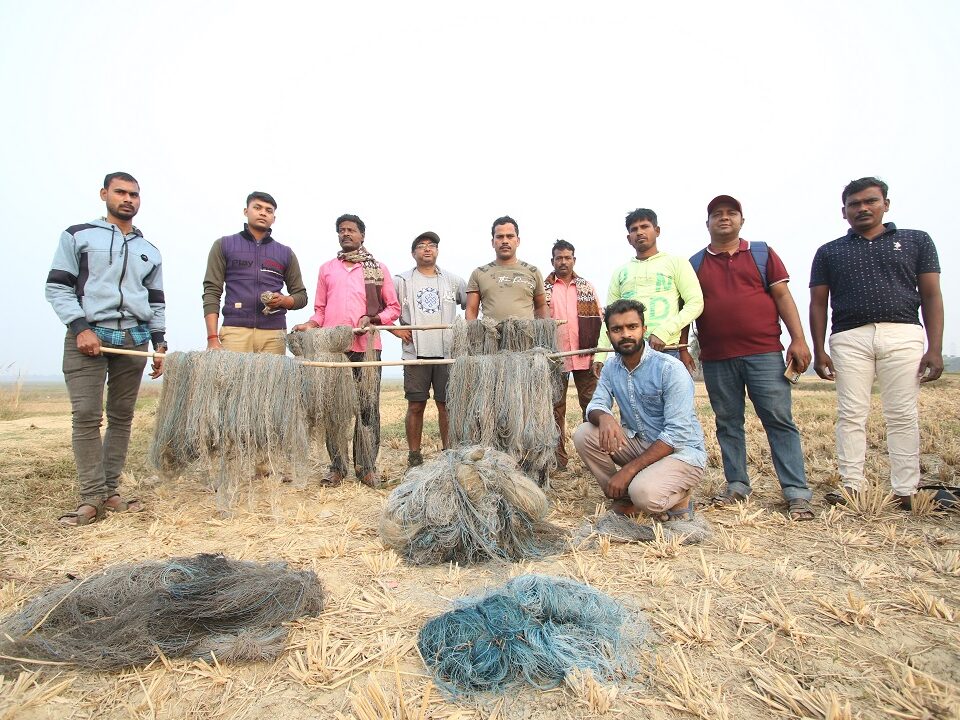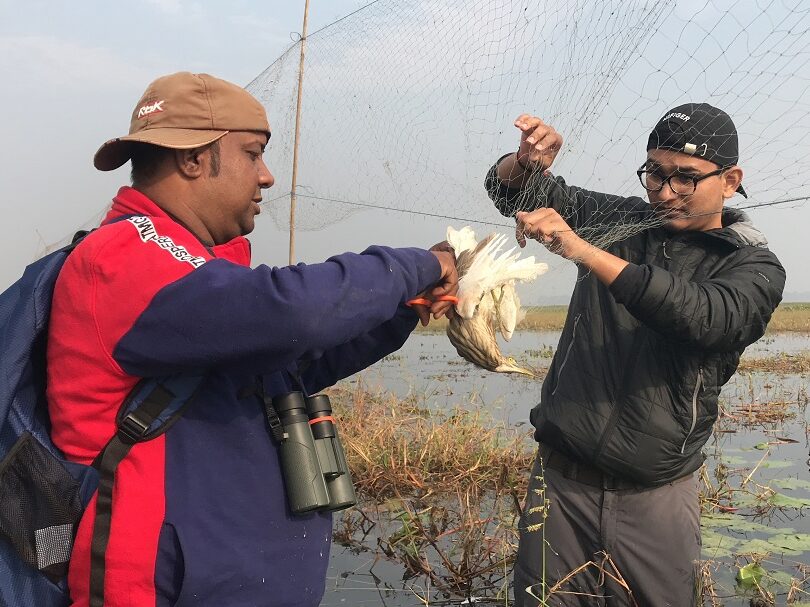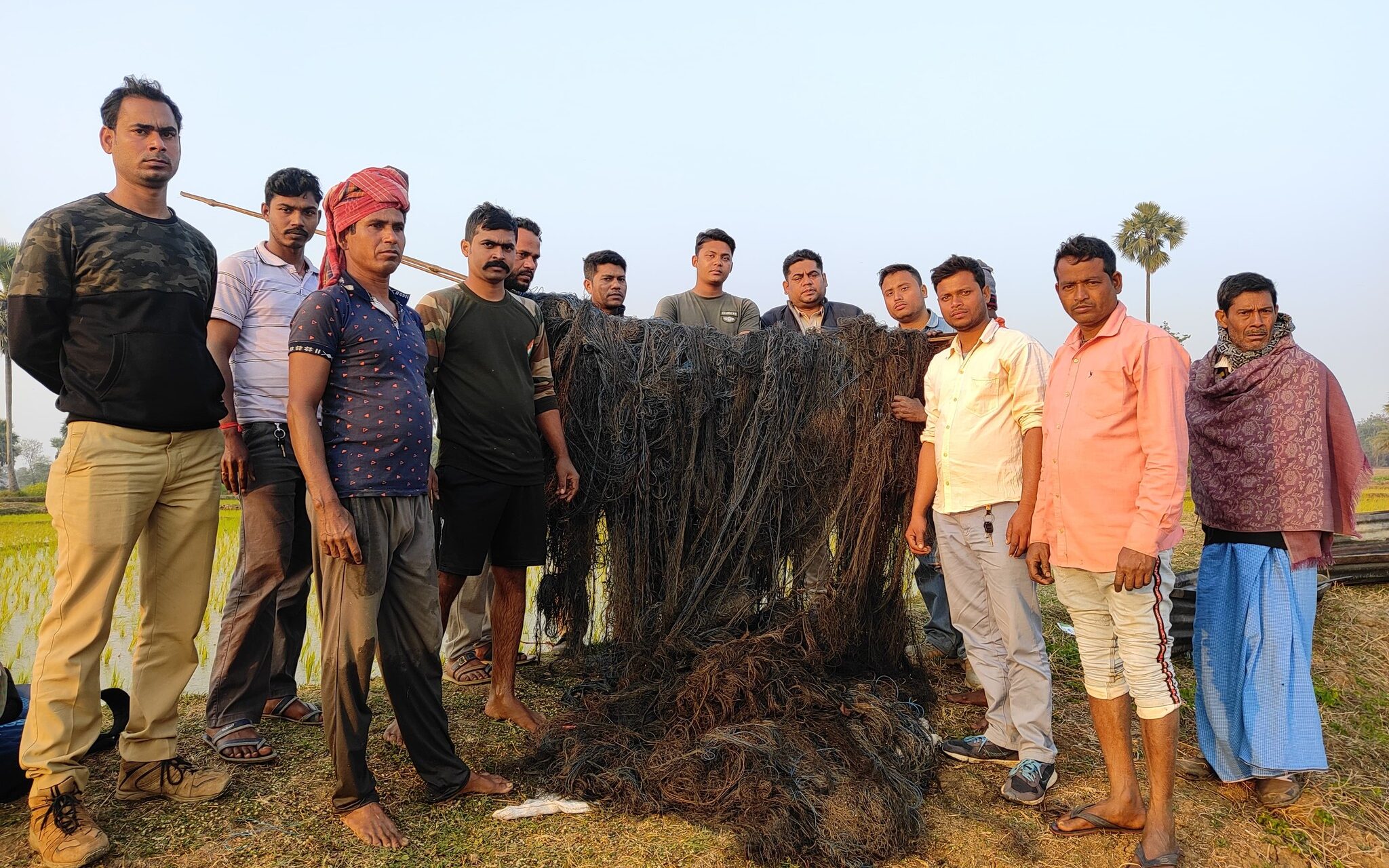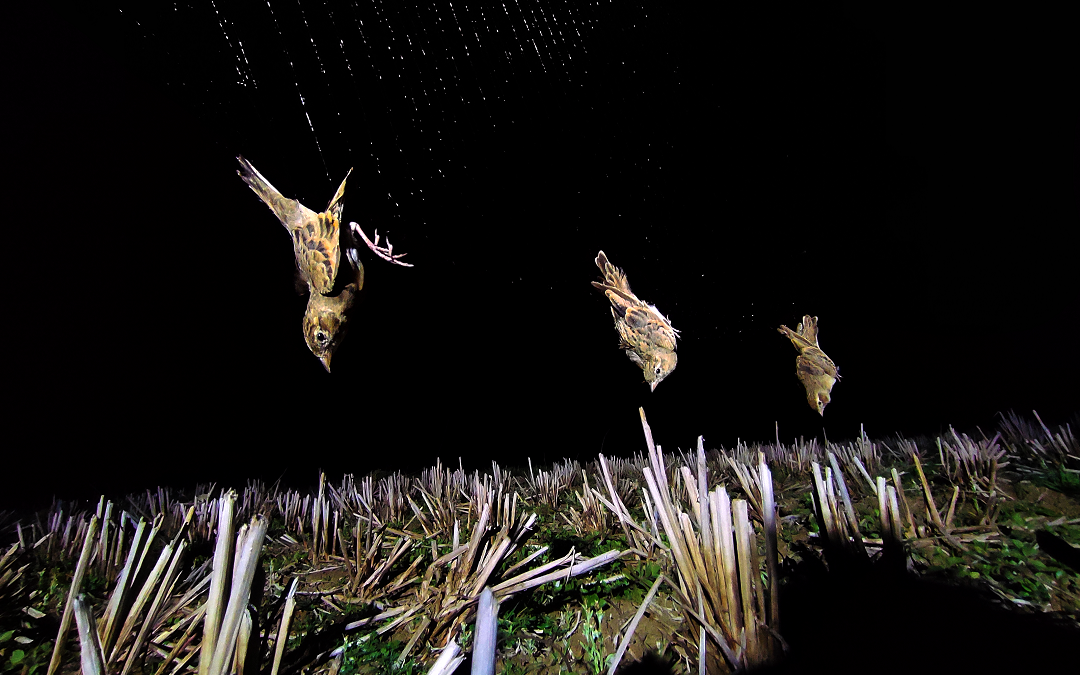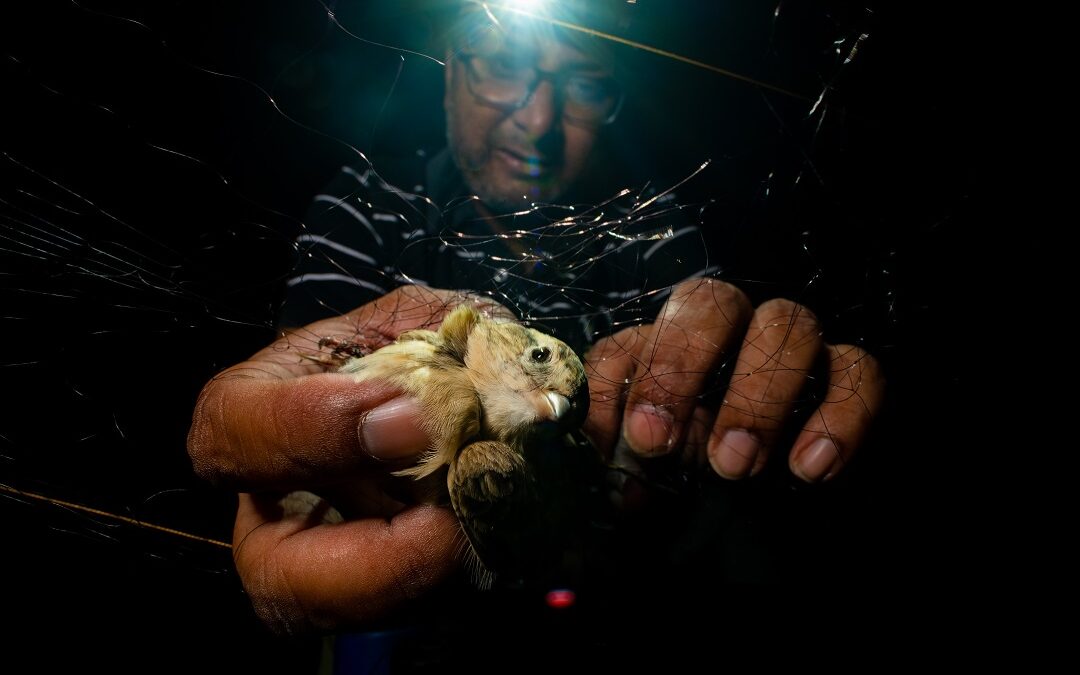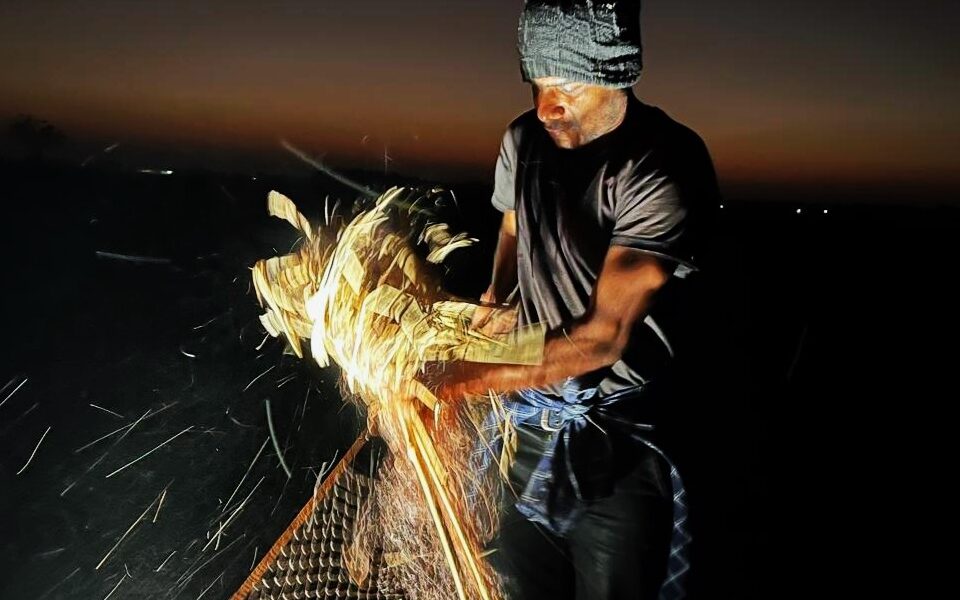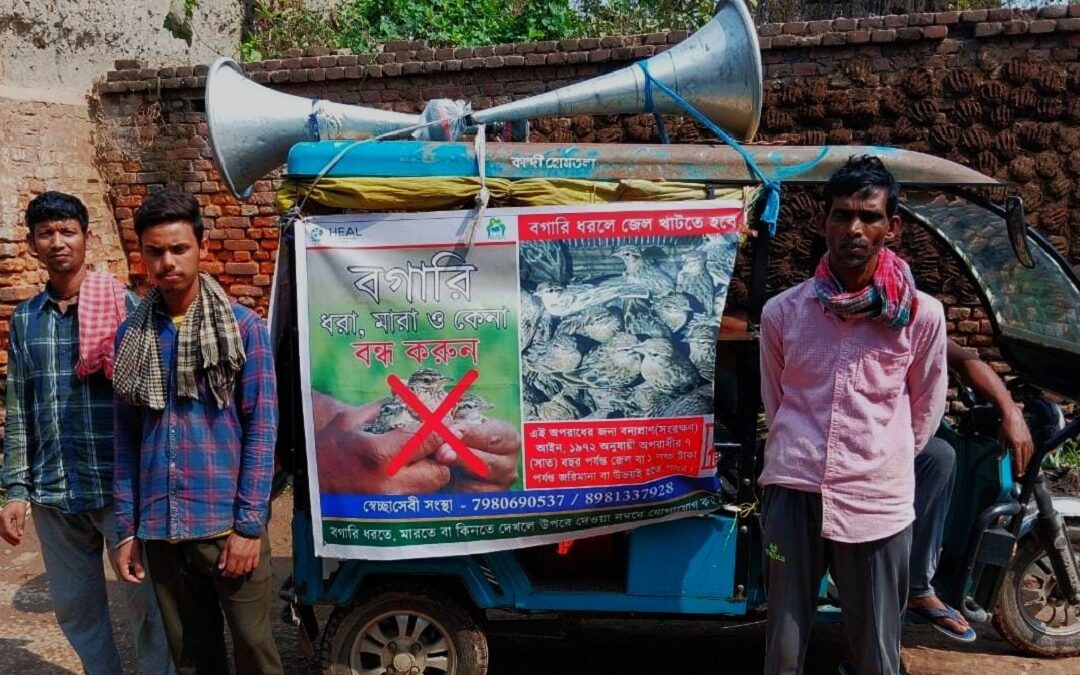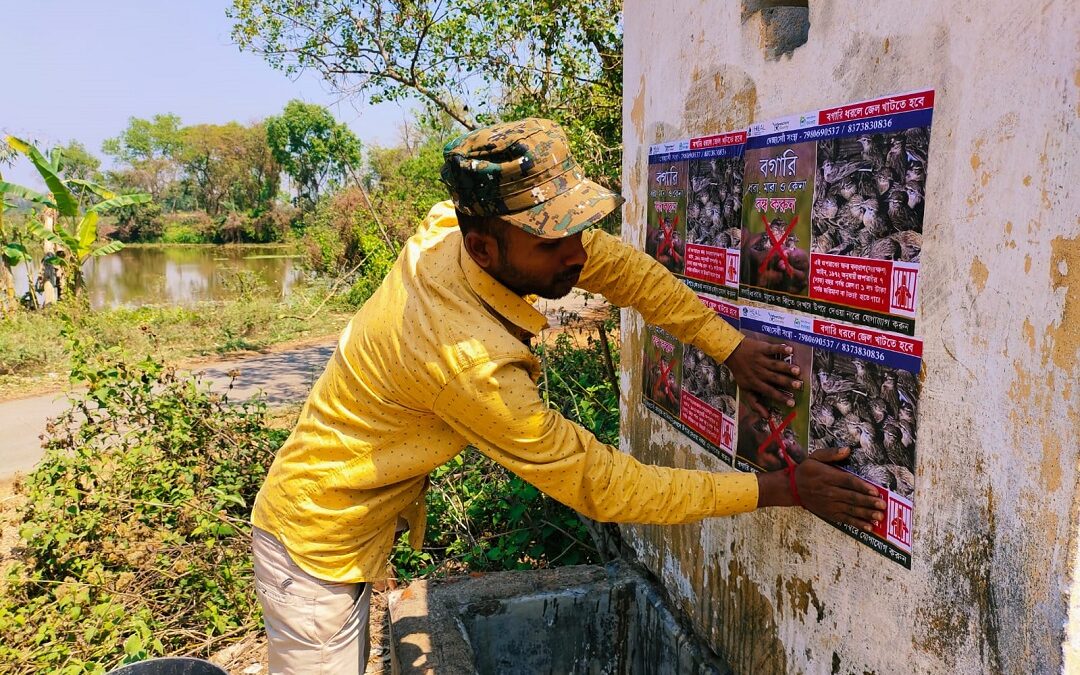Securing Safe Skies for Migratory Birds
Central West Bengal supports an astounding diversity of bird life. The abundant wetlands of the region and large swathes of agricultural land provide shelter and nourishment to over a hundred bird species. Many of these are winter migrants, arriving in West Bengal to escape the harsh weather of their breeding grounds. Unfortunately, there is a huge local demand for wild bird meat which endangers the survival of these birds in Central West Bengal.
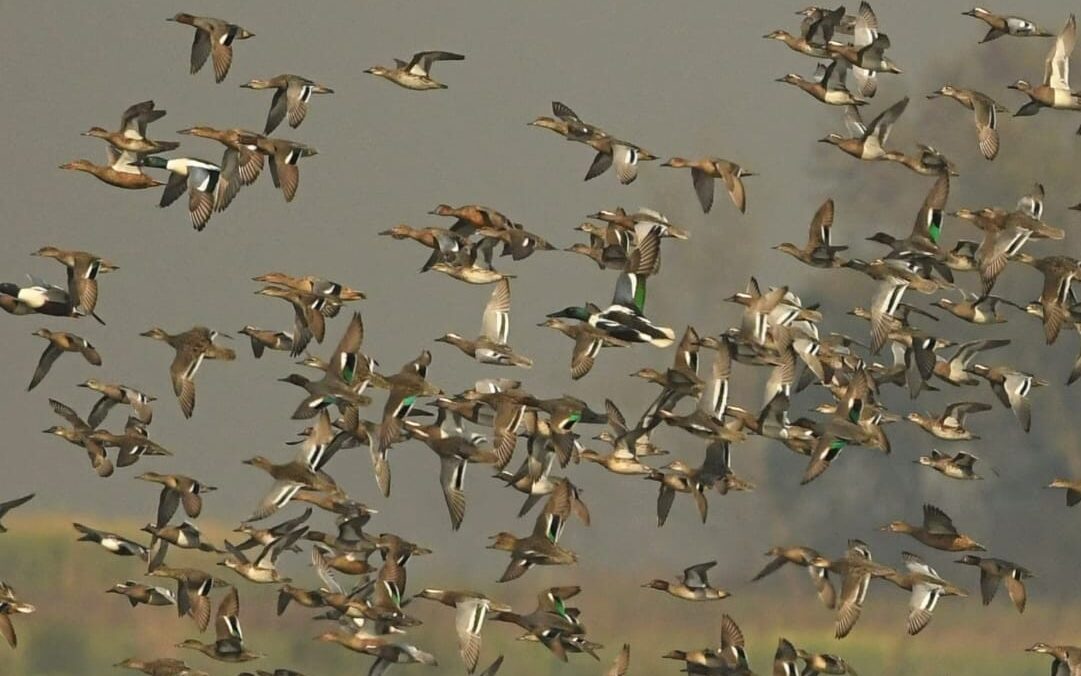
A Hostile Home
Murshidabad, along with Malda and Birbhum districts is a hotspot for illegal trade in wild caught birds. This illicit enterprise operates year-round but intensifies from October, when migratory birds arrive, becoming the primary target. To catch the incoming birds, mist nets, spanning several kilometres, are set up across wetlands. The trapped waterfowls and waders are sold at local markets for consumption. Other bird species, such as owls, egrets, drongos also get caught in the net. But since they don’t have a demand in the market, they are left entangled in the net where they die out of cold and injury.
In addition to waterfowls and waders, poachers also hunt various species of Larks and Pipits which are locally known as Bogari. Many of these form large flocks and migrate from central Asian and Trans-Himalayan cold deserts, only to be killed en masse. Fallow crop fields make ideal habitats for these birds as they prefer roosting in open lands with short, sparse vegetation. This makes them exceptionally easy to hunt. Poachers simply lay large nets over the birds when they roost on ground or stun them with bright light at night to drive them towards mist nets set up in agricultural fields.
A Large-Scale Crime
Using his informant network Soumyadip Mondal, HEAL’s Zonal Coordinator in Murshidabad had been gathering intel on poachers and passing it on to enforcement authorities. This led to the arrest of one poacher in October 2022 and disciplinary action against two others in November 2022. However, following these initial arrests, HEAL continued to receive reports of nets present in numerous wetlands. As a result, the true scale of bird poaching began to come to the fore. What was initially thought to be the work of a few isolated individuals turned out to be a large-scale seasonal harvest of wild birds carried out by organised groups of experienced hunters.
Hunting and trading of native and migratory wild birds and/or their derivatives is a crime under the Wildlife Protection Act, 1972. Partaking in such activity is punishable with a jail-term of up to 3-7 years and fine of up to 25 Lacs. Further, India is a signatory to the Bonn Convention and as such has the obligation to protect and safeguard migratory birds. Despite these implications, poachers were setting up nets, catching birds and selling them with impunity. The absence of fear of retribution and presence of support from local communities who were unaware of environmental laws had enabled these poachers to operate at such a scale and destroy the region’s spectacular birdlife year after year.
HEAL’s Intervention
In collaboration with the Wildlife Trust of India (WTI) HEAL implemented a Rapid Action Project between December 2022 and April 2023. The project aimed to mitigate bird poaching in Central West Bengal and curb the illegal trade of wild birds which are protected under the law. To achieve these objectives, HEAL undertook the following measures:
Surveillance
- During the duration of the project, HEAL’s patrolling teams maintained constant vigilance over 25 wetlands and other bird habitats spread across 11 blocks in Murshidabad, Malda and Birbhum districts.
- These teams were composed of dedicated volunteers from the local community. Their primary responsibilities included conducting regular field surveys to detect and remove bird trapping nets; monitoring and gathering information on poachers’ activities and rescuing birds.
- The patrolling teams were successful in destroying close to 40 kilometers of bird trapping nets and confiscating an additional 10 kilometers from poachers during routine field surveys. Furthermore, the teams also rescued over 900 birds including 30 different species.
Law Enforcement
- HEAL collaborated closely with the Nadia-Murshidabad Forest Department, the local police and the Block Administration. Intel acquired through diligent surveillance was shared with the enforcement authorities, enabling them to jointly conduct raids with our team and arrest bird poachers.
- In an unprecedented development, a total of five bird poachers were apprehended. Local residents informed us that poaching activity significantly decreased after the arrests.
- This strong message of zero tolerance towards wildlife crime acted as an effective deterrent in regions where the arrests took place.
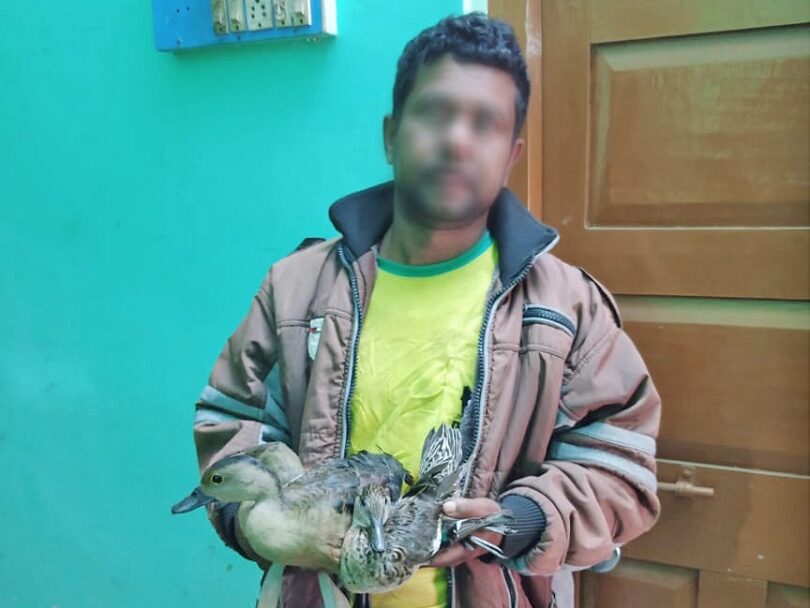
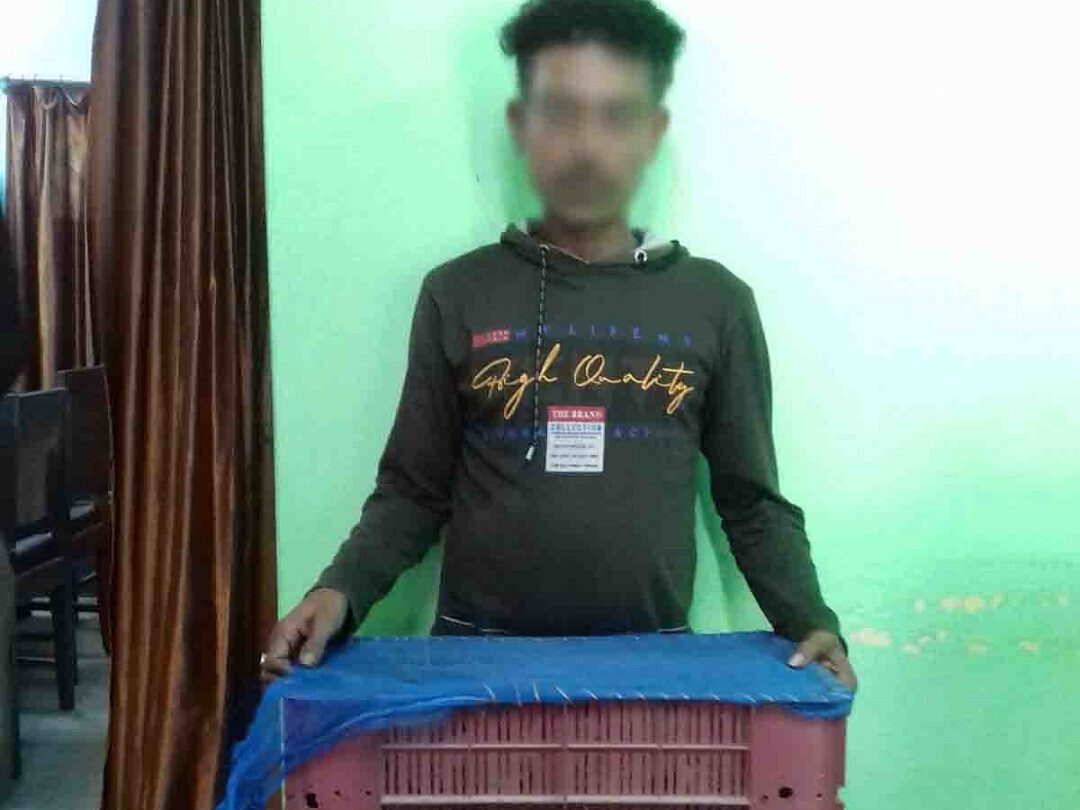
Sensitization
- Systematic efforts were undertaken to raise awareness among local communities about the illegality of hunting and consuming wild birds.
- These efforts involved conducting four awareness drives across Murshidabad and Malda districts and installing permanent metal sign boards at 18 locations in Murshidabad.
- In a heartening incident, a local from Bharatpur-I block, informed our team about a potential poacher using the number displayed on one of the sign boards. Moreover, the arrests themselves also contributed to the generating awareness among the local residents.
2024 Update
Protecting wetland birds
The aforementioned project marked a crucial starting point in the ongoing battle against the enduring threat of commercial poaching, which has persistently endangered migratory birds upon their arrival in central West Bengal year after year.
In line with our vision for a sustained program to protect migratory birds, we launched our field operations as early as October 2023 to extend protection to incoming birds. Field teams diligently patrolled wetlands in Murshidabad to detect the presence of bird-trapping nets. They received invaluable support from local villagers, who not only shared intelligence but also assisted in dismantling nets and rescuing ensnared birds. The largest number of nets was discovered in Beel Belun in February 2024, with almost 20 kilometers removed from this single wetland.
Protecting Migratory Larks and Pipits (Bogari)
During the aforementioned project, we only came to discover the tip of the iceberg with regards to poaching of migratory larks and pipits. The true extent of this illicit trade only came to the fore in 2024 during our systematic field operations. Our initial set of just six locations in just one district now encompasses more than 20 locations across 3 districts and we continue to gather more data every week.
Since the tentative start of Bogari hunting season on 15 February, our field teams have intercepted poaching gangs and thwarted their attempts to hunt Bogari almost daily in Murshidabad and Birbhum. The collective destruction of nets measures over 45 kilometers, and more than 1000 migratory larks and pipits have been rescued and released to date.
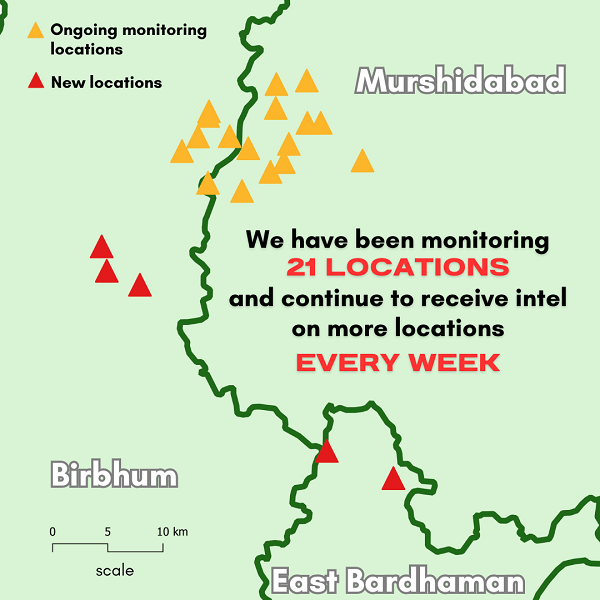
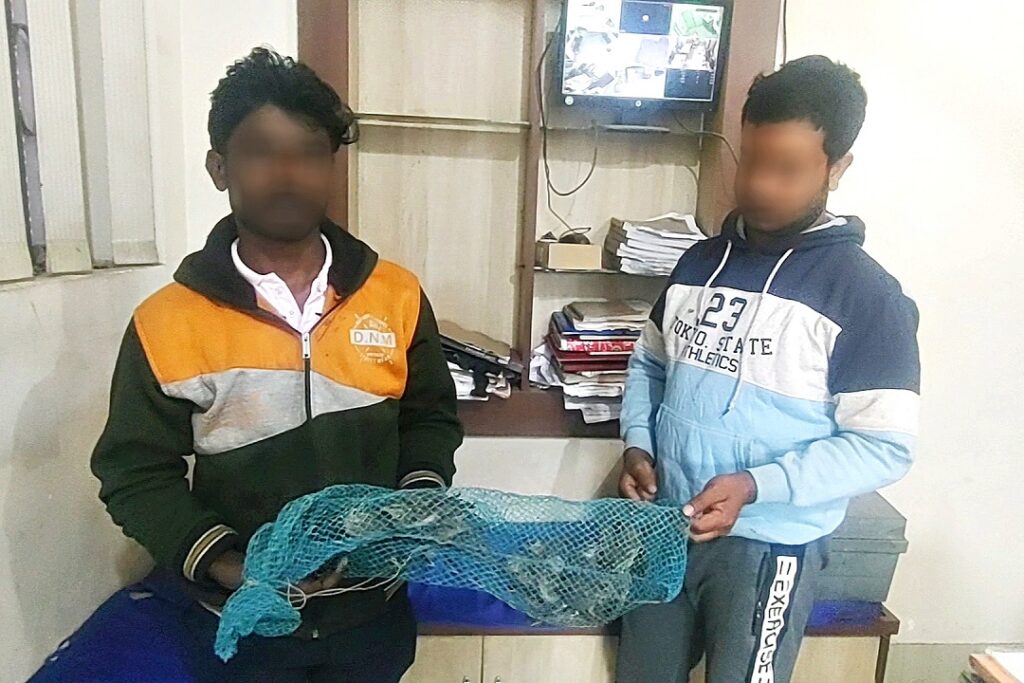
Lark poachers were apprehended by our team on two occasions – two on 20 February and another pair on 17 March. The first arrest occurred when two lark traders were picked up from inside Nagar Bazaar, a popular market in Murshidabad where Bogari are sold. The other arrest happened when two lark poachers were caught laying bird traps in a field in Birbhum.
Since 06 March, daily campaigning has been conducted in villages where most bird poachers reside. During these campaigns, leaflets are distributed, posters are displayed in public areas, and anti-poaching messages are broadcasted over loudspeakers. In addition to this, we collaborated with the Birdwatchers’ Society, and installed permanent metal awareness signboards in 15 new locations to publicise the legal implications of hunting or consuming Bogari. These sensitisation initiatives have been highly successful in encouraging locals to report poaching activities in their area, thereby allowing us to gather information about new locations in a third district – East Bardhaman.


